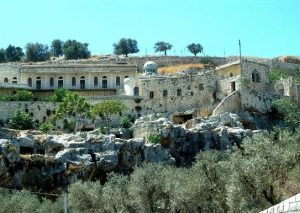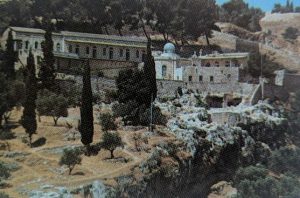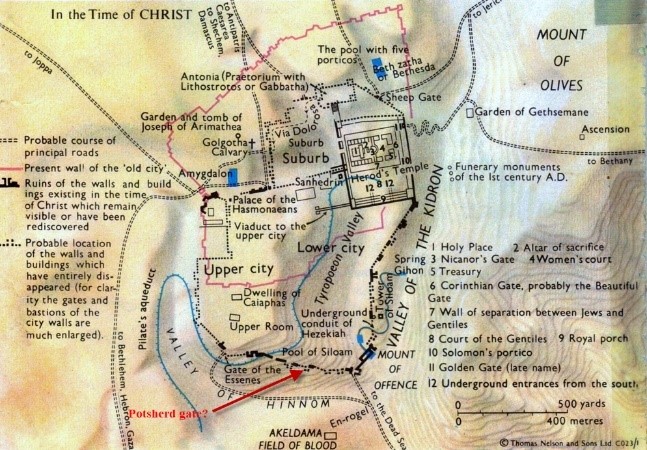Although Judas’ betrayal of the Lord for worldly gain was a great and grievous sin, there is good evidence that he was deceived and even supposed he was helping to establish the sort of kingdom all of the disciples were imagining in the existing climate of Roman rule and oppression. Unable to see any victory through death, he couldn’t imagine that Jesus would allow Himself to really be crucified, and by forcing a confrontation with the religious leaders he seems to have believed that Jesus would manifest His power and establish His rule. But now, seeing that he was badly mistaken, and that he could not undo his deed himself, he committed an arguably greater sin by not looking in faith to God to somehow undo his deed, and despaired of His mercy and forgiveness to take his own life, forevermore preventing the repentance unto life through which one receives forgiveness for sins; cf. Luk 24:47, 2Co 5:10, Heb 9:27; see also Mat 26:73-75, Act 7:58, 9:1, 1Co 15:9-10, 1Ti 1:13,15 for both Peter’s and Paul’s example. Having cast away into the temple sanctuary the money that burned his soul to death, it now became a quandary for the chief priests over what to do with it. They couldn’t lawfully put it into the temple treasury, for in taking the blood money to betray Jesus Judas prostituted himself with them against Jesus and so it was like the hire of a harlot (Deut 23:18). But neither could they receive it back since to do so would be to accept the responsi bility for Jesus’ death that they had pinned on Judas. In what they perhaps imagined was an answer to their prayers, it appears that in the investigation of Judas’ suicide they discovered that he was in the process of purchasing the field where he had hung himself with the money he had obtained, so they simply completed the sale in his name. Further, since Judas’ body was not discovered for some time and the land was defiled by the gruesome end of his decomposing corpse (Act 1:18), it became a burial place for strangers, i.e., for foreigners to the city who died while there and had no other family plot to be
bility for Jesus’ death that they had pinned on Judas. In what they perhaps imagined was an answer to their prayers, it appears that in the investigation of Judas’ suicide they discovered that he was in the process of purchasing the field where he had hung himself with the money he had obtained, so they simply completed the sale in his name. Further, since Judas’ body was not discovered for some time and the land was defiled by the gruesome end of his decomposing corpse (Act 1:18), it became a burial place for strangers, i.e., for foreigners to the city who died while there and had no other family plot to be  buried in. As a consequence of its sordid history, by what name did the field come to be called? See Mat 27:8. Why does Luke say that the name stuck? See Act 1:19. What does this teach us about how, even apart from the gospel, Jesus’ unjust death and Judas’ macabre end were memorialized by the people of Jerusalem in the naming of this field? What is the significance that the traditional location of this field is adjacent to the valley of Hinnom, i.e., Gehenna? See Mat 5:22,29-30 and NAS text note.
buried in. As a consequence of its sordid history, by what name did the field come to be called? See Mat 27:8. Why does Luke say that the name stuck? See Act 1:19. What does this teach us about how, even apart from the gospel, Jesus’ unjust death and Judas’ macabre end were memorialized by the people of Jerusalem in the naming of this field? What is the significance that the traditional location of this field is adjacent to the valley of Hinnom, i.e., Gehenna? See Mat 5:22,29-30 and NAS text note.
To whom does Matthew say that the field formerly belonged? See Mat 27:7, and note that the traditional site of Hakeldama is also opposite the Potsherd Gate across the Hinnom valley (Jer 19:2) where excellent potter’s clay can be found. Also observe from the photos that, as in many places throughout Israel, the field was not necessarily level as we think of fields, but on a hill with potential precipices, perhaps further explaining Luke’s description of Judas’ end. What is the spiritual significance that the blood of Christ literally purchased a potter’s field that became a place where the broken vessels of strangers were buried? Cf. Jdg 7:16-19, Psa 31:12, Lam 4:2, 2Co 4:6-12, Eph 2:12,19, Heb 11:13, 1Pe 2:11. See also Gen 23:3-4, and observe that Christian graveyards have often been referred to as God’s fields, where He sows the choice seed of His people like grain for a harvest at the resurrection; cf. Hos 2:23, Joh 12:24-26, 1Co 15:20-23, 35-37.

Yes, it was probably the case that Judas believed Yeshua would never allow himself to be crucified, which is why he betrayed Him to the Chief Priests. But we must remember the harsh things Yeshua said about Judas prior to his act of betrayal; i.e. “have not I chose you twelve and one of you is a devil?” and “it would had been better had that man never been born”. We know that as treasurer, Judas had been stealing money from the treasury and even had the chutzpah to complain about Miriam washing Yeshua’s feet with expensive nard oil. He claimed that the money from its sale could have been given to the poor, when in fact his real motivation was downright wicked; i.e. Judas wanted to control the proceeds from the sale of that oil so he could steal from it. Let that sink in for a minute. It was bad enough he was so narcissistic that he couldn’t see beyond his own greed to appreciate the love that Miriam and others had for Yeshua. But worse, he was so deceived that he brazenly lied to Yeshua about his real motives when it should have been obvious to him by then that Yeshua knew he was lying; i.e. Yeshua had already demonstrated the ability to know peoples’ thoughts. Or, perhaps Judas did know that Yeshua knew his thoughts and presumptuously believed Yeshua didn’t stop him nor expose him. because he thought Yeshua saw him as an equal. So then, what Yeshua said about him was 100% true – Judas was indeed, a devil.
In modern day terms, Judas was a narcissistic sociopath. It was always and only about what would benefit him. Peter’s denial of Yeshua was very troublesome considering he boasted he would never forsake Him and proclaimed he would even go to death with Him. But Peter wasn’t following Yeshua for what he could gain from Him. While Peter could be boastful, impetuous and presumptuous, he genuinely loved Yeshua. While Judas may have had some level of affection for Yeshua, he had far more love for himself than anyone else. Yeshua made promises to His followers of sitting on thrones and judging Israel but He also admonished them of the persecution which would precede reigning with Him in the Tikkun Olam (i.e. regeneration). But Judas heard what he wanted to hear only receiving the part about reigning with Yeshua. It’s a perfect example of how he projected his own desires into what Yeshua had taught them. This was manifested in his greed and the ultimate act of betraying Yeshua for 30 pieces of silver; i.e. Judas was deceived by the narcissistic idolatry of his own heart. The “bread of deceit was sweet to him” (Prov 20:17). I’m sure his reasoning went something like this; “since Yeshua isn’t keeping up his end of the bargain to make me rich and powerful, I’ll force him to. After all, I have an equally important role here as the finance manager. Of all the capable men of Israel, Yeshua picked me for my great talent with finance”. No doubt, Judas presumptuously and quite foolishly thought Yeshua would never allow himself to be crucified. The great riches and power Judas imagined he would receive must have been like the sweet fulfilling taste of freshly baked pita bread, but instead what he ended up with was “his mouth was filled with gravel”. Having realized his massive error, he was so overwhelmed with shame that he hanged himself – yet another manifestation of his selfishness, being consumed with self-pity and committing the ultimate narcissistic act.
How ironic that the piece of property he probably planned to buy to have a palatial house built on, became a cursed potter’s field that he shamefully died in. But there’s a greater irony. At the time Annas had his tomb built, the potter’s field was far enough away that he presumed it could never taint his glorious burial site. There were probably other wealthy individuals who owned plots of land that were a buffer between his plot and this field and perhaps even strict codes over how those parcels of land could be used. Annas no doubt, arrogantly and presumptuously thought that the shame of a dirty unclean betrayer like Judas could never cling to such a righteous Kohanim HaGadol (high priest) as himself. But over the centuries, the boundaries of the Akeldama spread until the entire area came under its curse, including Annas tomb. He never thought a time could come where his glorious tomb would be defaced and inhabited by strangers (Arab shepherds) with the beautiful stone carved rosette ceiling inside his tomb, blackenedwith soot from fires built for warmth and the floor desecrated with animal dung. You see, God will not be mocked. Whatever a man sows that he will reap.
This is instructive to us because let’s be honest – Yeshua warned all of his disciples about greed (covetousness). He admonishes us all to deny ourselves and take up our cross daily if we want to follow Him. Eleven heeded His words, one did not. And the one to whom Judas betrayed Yeshua to, didn’t escape judgment either. We no less than they, are faced with the same choice. What will we do?
Thank you Steve for your very insightful comment.